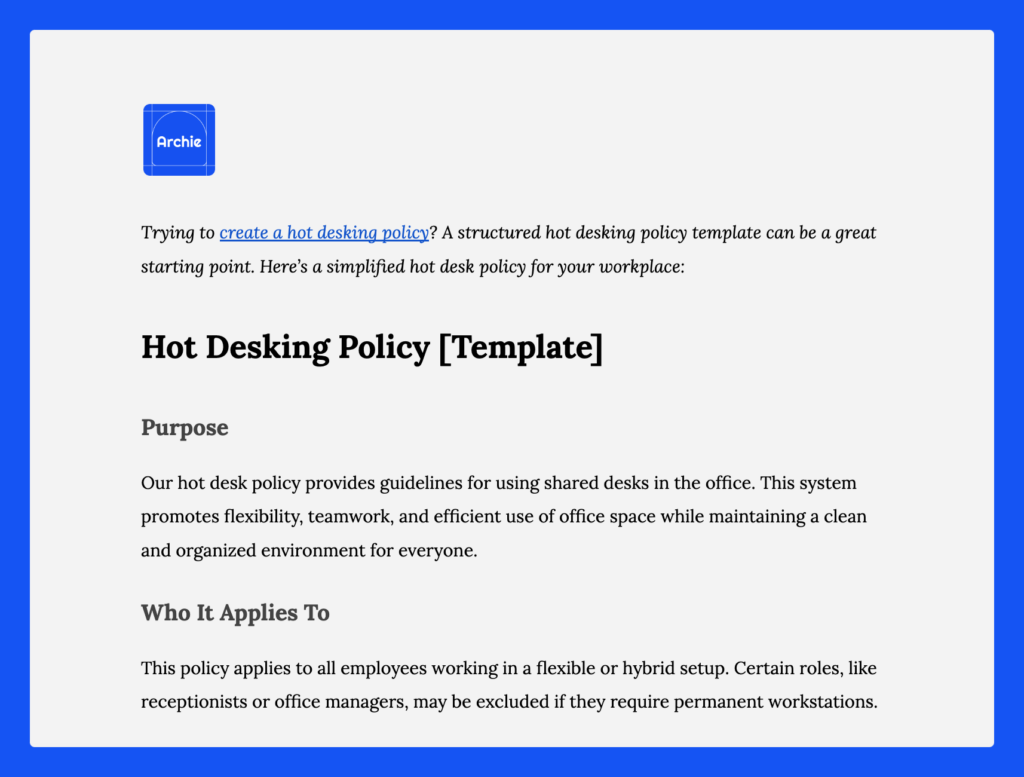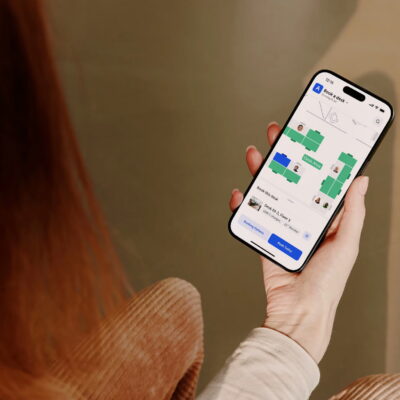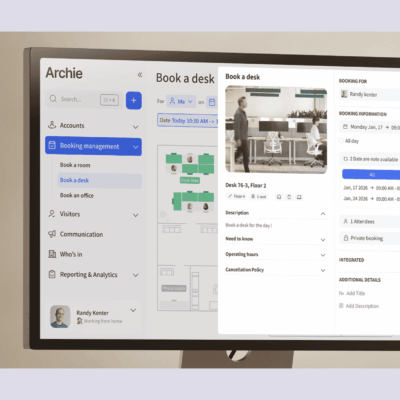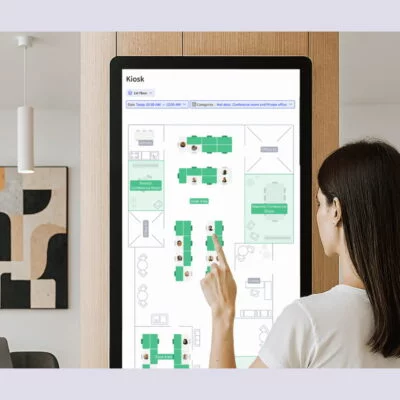- Originally published: November 23, 2023
- Last updated: December 19, 2024
Trying to introduce a hot desking policy in your office? Archie’s hot desk policy template will get you started. There’s no need to enter your email address — the template is completely free to download.
What is a hot desk policy?
A hot desk policy outlines the rules for using shared desks in an office. It ensures a smooth hot desking process by preventing confusion, keeping the workspace organized, and helping employees stay productive.
What should a hot desking policy include?
A good hot desk policy should include:
- Definition and purpose: Explain what hot desking is and highlight its benefits, like saving space, improving flexibility, and encouraging networking.
- Desk booking process: Outline how desks can be reserved (for example, using an Excel desk booking system, desk scheduling solutions, or online calendars).
- Desk usage rules: Set hot desking guidelines for reservation time limits, no-shows, cancellations, and making changes to bookings.
- Workspace maintenance: State expectations for cleanliness, managing personal belongings, and keeping desks tidy for the next user.
- Technology and equipment use: Provide clear instructions on using shared devices, like monitors, phones, or docking stations, ensuring they’re accessible to everyone.
- Feedback and improvement: Create ways for employees to share feedback so the desk sharing policy can be updated and improved over time.
Developing your hot desk policy
Are you thinking about introducing a hot desking policy in your office? Here’s a step-by-step guide to developing one that’s effective, practical, and tailored to your team’s needs:
1. Understand your team’s needs
Take the time to learn how your employees prefer to work. Do they need quiet zones for focused tasks or value sitting near teammates for collaboration? Understanding these preferences will help you design an open desk policy that suits everyone.
2. Involve your employees
Don’t make it a one-person job! Get input from different teams, roles, and departments. This will ensure that the shared desk policy is inclusive and practical for the whole office, not just a few groups.
3. Write a clear hot desking policy
Draft a policy that outlines the hot desking rules and guidelines in plain language. Cover key points like desk booking procedures, hot desk etiquette, and any tools employees will use. If you’re stuck, consider starting with a hot desk policy template (like the one below ↓) and customizing it for your office.
4. Communicate the desk sharing policy
Don’t just send out a single message and call it a day. Use multiple channels — emails, team meetings, and office announcements — to ensure everyone knows how the system works and where to find the details. Don’t forget to include it in your onboarding process when welcoming new employees.
5. Continuously review and improve your hot desk policy
Once the hot desk policy is in place, collect regular employee feedback about what’s working and what isn’t. Update the hot desking protocols as needed to reflect changes in workplace dynamics or employee preferences.
This way, you can create a hot desking policy that keeps your office running smoothly while making it easy for employees to adapt to the system.
Free hot desk policy template
A structured hot desking policy template can be a great starting point. Here’s a simplified desk-sharing policy for your workplace:
Hot Desk Policy [Template]
Purpose
Our hot desk policy provides guidelines for using shared desks in the office. This system promotes flexibility, teamwork, and efficient use of office space while maintaining a clean and organized environment for everyone.
Who It Applies To
This policy applies to all employees working in a flexible or hybrid setup. Certain roles, like receptionists or office managers, may be excluded if they require permanent workstations.
How Hot Desking Works
- Choose Any Available Desk: Desks are not assigned. Employees can use any open desk each day.
- Clear Your Desk: At the end of your workday, remove all personal items and leave the desk tidy for the next user.
- Storage: Personal belongings should be stored in lockers or designated areas.
- Equipment: Shared equipment like monitors, keyboards, and chairs are available. Report any technical issues to IT for quick assistance.
Employee Responsibilities
- Keep Desks Clean: Sanitize your workspace before and after use. Cleaning supplies are provided.
- Respect Others: Keep noise levels down and use meeting rooms for calls or discussions to avoid disturbing others.
- Protect Confidential Information: Log out of computers, lock screens, and avoid leaving sensitive documents behind.
- Report Problems: If you face issues with desks, seating, or equipment, notify IT or HR.
Company Support
To ensure a smooth hot desking experience, we will:
- Provide lockers for personal storage.
- Supply cleaning materials and ergonomic equipment.
- Offer a clear desk booking system to avoid conflicts.
- Maintain well-equipped and comfortable workstations with proper lighting and seating.
Disputes and Concerns
Employees are encouraged to resolve the matter respectfully if there’s a conflict over desk space or any concerns arise. If needed, escalate the issue to HR or your manager.
Note: This open desk policy will be reviewed regularly to ensure it continues to meet the needs of the team. Any changes will be shared in advance.
By following these hot desk guidelines, we can create a clean, productive, and flexible work environment that works for everyone. If you have questions, reach out to the HR team — we’re here to help!
Hot desk policy rules to consider
- Easy hot desk booking system: There are a few options to consider here, but generally, a dedicated desk booking tool like Archie is the best option to help employees reserve desks easily and avoid conflicts over availability.
- Equip desks with essentials: Make sure each desk has necessary supplies, like power outlets, USB ports, stationery, and cleaning wipes, so employees can get to work quickly.
- Quiet work zones: Designate specific areas as quiet zones for employees who need focus and minimal distractions.
- Reliable IT support: Provide quick access to IT support for issues like internet connectivity, hardware problems, or access to shared systems.
- Promote a sharing mindset: Encourage employees to view desk sharing as a way to foster teamwork, collaboration, and a sense of community.
- Support health and comfort: Provide ergonomic furniture, such as adjustable desks and chairs, and remind employees to take breaks to avoid discomfort from sitting too long.
- “Clean” hot desking protocols: Implement regular cleaning schedules for desks and shared equipment. Provide hand sanitizer and disinfectant wipes to keep workspaces clean.
- Secure personal storage: Offer lockers or secure storage spaces where employees can keep their personal items while using hot desks.
- Hot desk rules reminders: Place clear signs in hot desk areas to remind employees of key guidelines, like keeping desks clean, respecting time limits, and protecting privacy.
- Collect regular feedback: Set up a process for employees to share their thoughts on the hot desk setup. Use their feedback to improve the system over time.
A strong hot desk policy goes beyond basic rules — it supports a flexible, efficient, and collaborative workplace.
Advanced insights for hot desk management
Apart from setting clear hot desking rules and maintaining the hot desk policy, you can also further optimize your hot desk booking process with dedicated tools.
Hot desk booking software, also known as a desk reservation system or hot desk app, makes it simple for employees to reserve and manage desks — whether in advance or on the spot. It’s designed to help businesses make the best use of office space while giving employees flexibility in where they work. Its key features include:
- Easy desk reservations: Employees can book desks for one-time use or set up recurring bookings for regular office days, saving them the hassle of daily reservations.
- Mobile access: Mobile apps let employees book desks, check availability, and get notifications — all from their phones. This adds convenience and improves efficiency.
- Interactive floor plans: Visual maps show available desks and office layouts, making it easy for employees to select their preferred workspace with a click.
- Live availability: Real-time updates prevent double bookings and help users see which desks or meeting rooms are free. Some systems also allow users to filter options by amenities.
- Employee lookup: Teams can locate colleagues easily, fostering collaboration. Some systems even notify employees when their teammates are in the office.
- Data insights: Built-in analytics track desk occupancy, peak times, and trends, helping office managers optimize layouts and reduce wasted space.
- Seamless integrations: Many desk booking platforms sync with tools like Google Calendar, Microsoft Teams, and Slack, making reservations a natural part of your workflow.
If you’re looking for an affordable, all-in-one solution for managing desk reservations, meeting room bookings, and visitor check-ins, Archie is an excellent choice. It’s perfect for hybrid workplaces, offering flexible pricing based on resources (like desks or rooms) rather than users.
Hot desk policy FAQ
The purpose of a hot desking policy is to set clear rules for sharing desks in the office. It helps everyone understand how the system works, ensuring desks are used fairly and without confusion. This way, all employees have equal access to available desks, and no one feels left out.
The policy also ensures that shared desks stay clean and organized. Employees are asked to clear their personal items at the end of the day so the desks are ready for the next person. Overall, the goal is to create a flexible, productive, and fair workspace that works well for everyone.
With an effective hot desk policy, companies can:
- Save space and money: Use desks more efficiently and reduce costs like rent and utilities.
- Increase flexibility: Let employees choose where to work based on their needs or tasks.
- Encourage teamwork: Create opportunities for employees to meet and collaborate with different coworkers.
- Keep workspaces tidy: Set simple rules to keep shared desks clean and ready for the next person.
- Adapt to modern work setups: Support hybrid or flexible work arrangements while maximizing office resources.
In short, a hot desking policy helps create a fair, organized, and flexible workplace where everyone can be productive. What’s not to like about that?
The hot desk policy should make it easy and fair for everyone to use shared desks. Employees can choose any free desk when they come to the office since desks aren’t assigned to anyone permanently. Some areas may be set aside for specific teams or group work, so employees can pick desks based on their needs, like sitting near teammates or in a quiet spot. In some offices, employees may need to book desks ahead of time using a desk booking app or tool to ensure no confusion.
To keep things organized, employees must follow a clear desk rule: They must clear their desks of personal items at the end of the day. Lockers or storage spaces are provided for storing belongings safely. The company should also welcome employee feedback to improve the hot desking system for everyone involved.
To manage hot desks effectively, start by setting up a simple system for reserving desks. Use an Excel desk booking tool or a dedicated desk booking app so employees can easily check which desks are free and book one in advance. Make sure the process is easy for everyone, whether they’re using a phone or computer. Share clear hot desking rules, like how long desks can be reserved and what happens if someone cancels. Also, create quiet zones for focused work and team areas for collaboration to meet different work styles.
It’s also important to keep desks well-stocked and tidy. Make sure every desk has basic supplies like monitors, power outlets, and cleaning wipes for quick sanitizing. Ask employees to clear their desks of personal items at the end of the day so the space is ready for the next person. Regularly ask your team for feedback to see what’s working and what can be improved. By creating a respectful and flexible environment, you can make hot desking a positive experience for everyone.
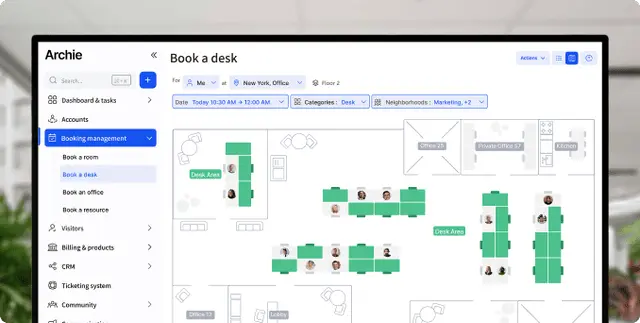
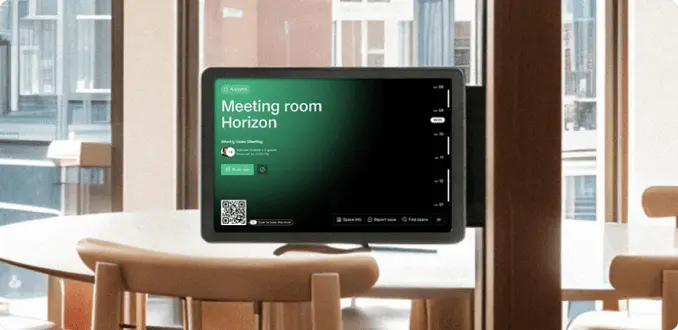
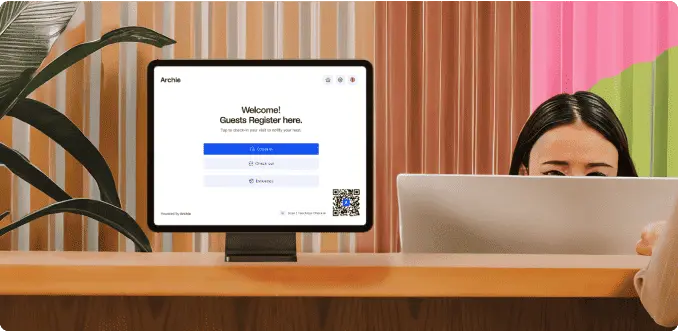
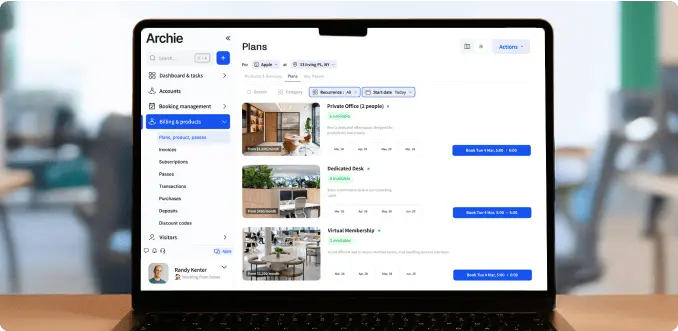

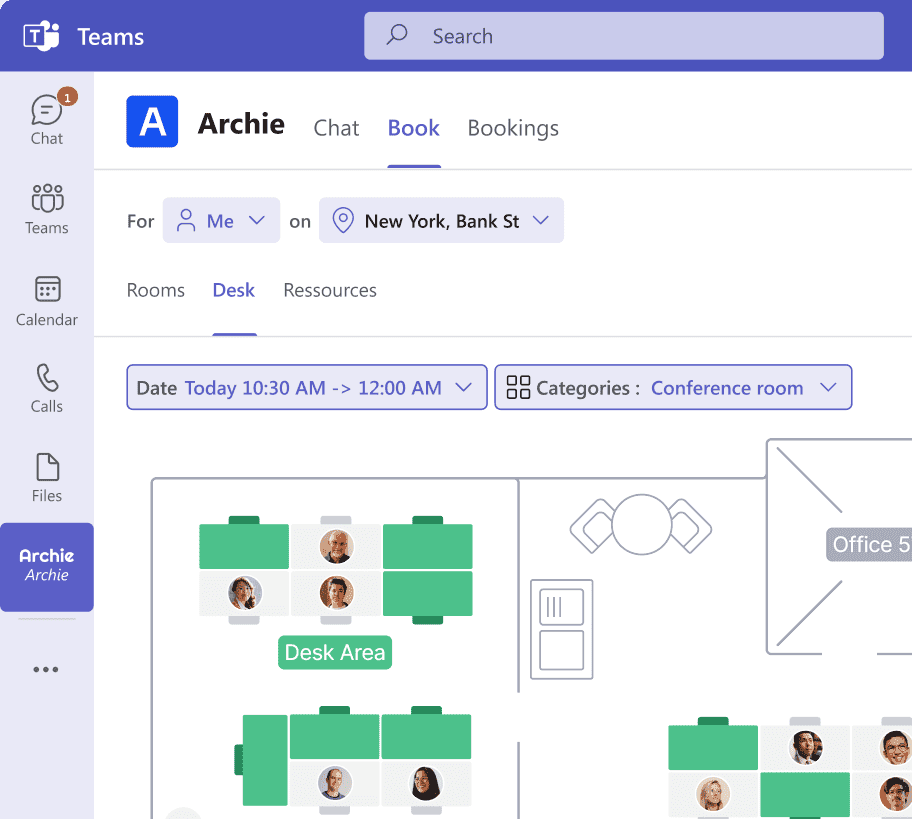
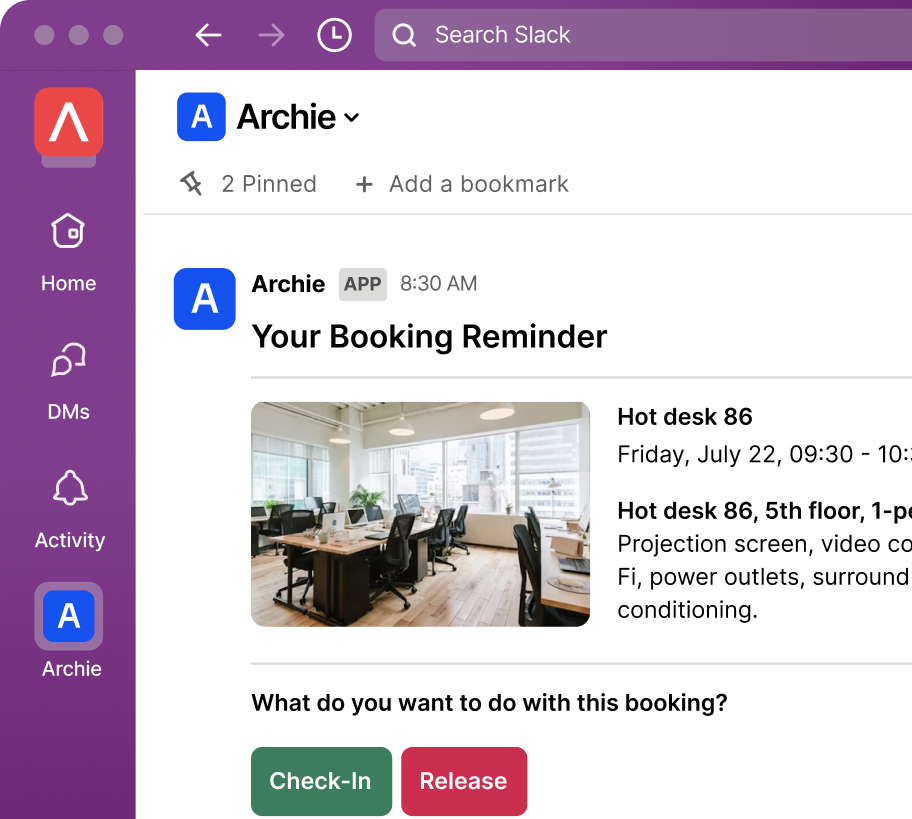
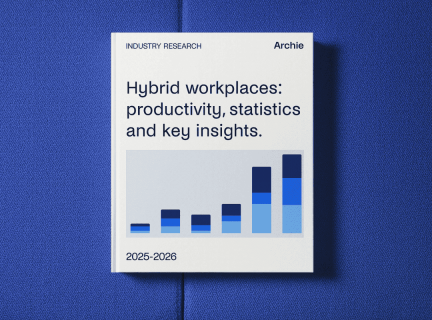

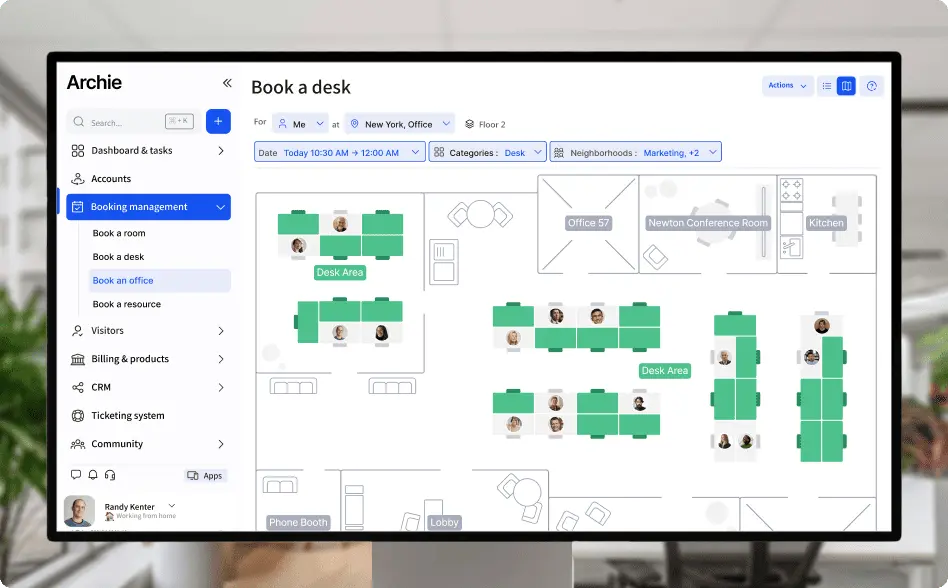
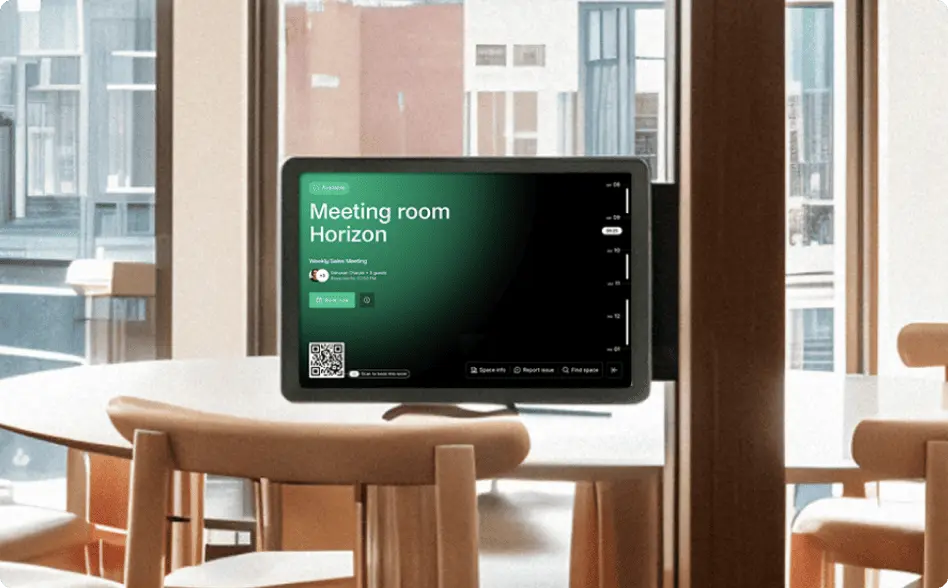
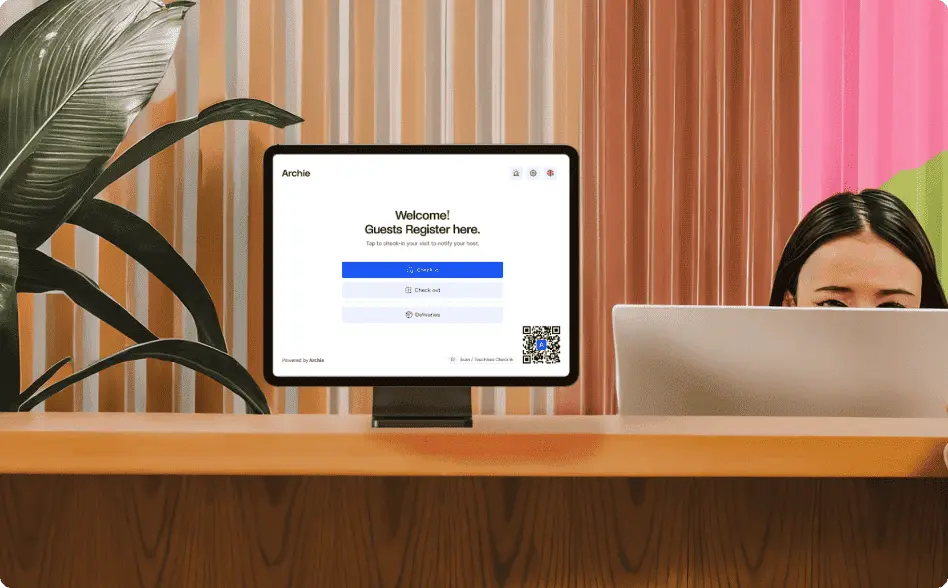
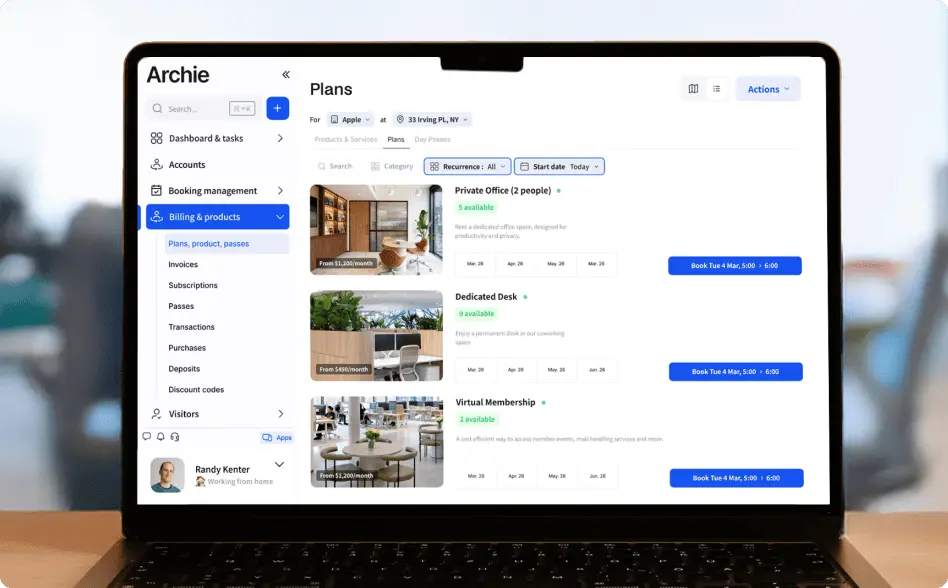




![Effective Hot Desking Policy Template [Free PDF] A modern office space with a row of height-adjustable standing desks positioned near large windows that let in natural light.](https://archieapp.co/blog/wp-content/uploads/2023/11/Hot-desk-policy-cover-image.jpg)
